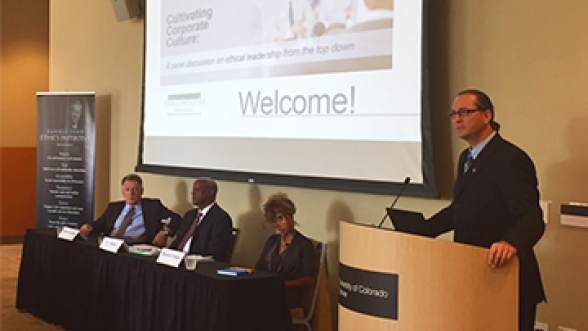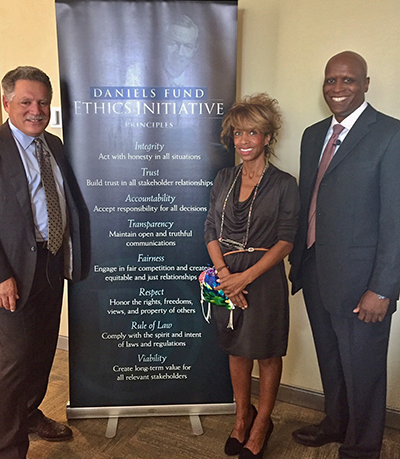
When you hear “business ethics”, what’s the first thing that comes to mind? A lack of ethical behavior in many well-known organizations? Corporations like Wells Fargo, Volkswagen, and even the NFL Patriots’—They’ve all been widely criticized for unethical behavior.
So how can you define an ethical corporate culture if these huge organizations aren’t able to?
Recently, a panel of business leaders participated in a discussion hosted by the Daniels Fund Ethics Initiative at the University of Colorado Denver Business School. A crowd of over 150 listened with interest, as panelists shared their experiences with implementing ethical business leadership from the top down.
Panelists included Maisha Fields, a professor at the CU Denver Department of Communication; T.J. Hasty, director of ethics and compliance for Lockheed Martin; and Walter Isenberg, founder, president, and CEO of Sage Hospitality.

The panel agreed: a truly ethical corporate culture can only be attained through top-down leadership. That is, leadership must truly buy into the culture and lead by example. In doing so, cultural norms are established.
According to Isenberg, “An ethical organization is one that’s living ethically each and every day, because people do pay attention to how leadership acts.” However, he cautioned, an ethical culture may be easier to achieve in a private versus public organization.
“Employees of public companies face immense pressure to increase earnings and drive growth. This places a huge burden on them and can ultimately lead to unethical behavior in order to meet the numbers,” Isenberg elaborated.
Mr. Hasty added, “Effective leadership isn’t only about getting results, it’s about getting results the right way. Leaders must continually promote ethical behavior and make decisions that promote a positive ethical culture.”
He explained that in Lockheed Martin’s organizational culture, employees are expected to act with integrity in everything they do. The company has implemented a comprehensive ethics and compliance program to reinforce ethical behaviors. All Lockheed Martin employees must complete training that provides them with the tools necessary to identify and address questionable situations. The company also offers employees a variety of methods for reporting unethical behavior, including an anonymous ethics helpline.
However, not all organizations take the same approach. “In my opinion, these ‘anonymous’ hotlines just encourage an overall sense of distrust,” said Isenberg. “And that’s the opposite of what we want. We respect our employees, regardless of job level or title. We want to empower them to make decisions and act with integrity. To be accountable for upholding this inclusive, ethical culture we have developed,” he continued.
Ms. Fields focused on the theory of ethics in the workplace, arguing that humans simply are not able to be 100 percent ethical 100 percent of the time. However, companies that focus on establishing an emotional connection with employees have the best chance at developing a positive overall culture.
“When people feel wronged, that’s when things can go south. So empowering employees, by recognizing and rewarding smart decision-making, you end up with happier employees overall,” she commented. “This sets the stage for defining a positive corporate culture.”
The discussion concluded with an energetic question and answer session. The panelists addressed a range of questions related to real-life ethical dilemmas, providing the audience with a framework for assessing and acting on questionable situations in the workplace.
The panel was hosted by the Daniels Fund Ethics Initiative at the University of Colorado Denver Business School. In 2015, the University of Colorado Denver Business School received a grant from the Daniels Fund to participate in the Daniels Fund Ethics Initiative, which is aimed at teaching students principle-based ethics, emphasizing real-world application of ethical principles, and extending ethical behavior beyond campus and into the community.


